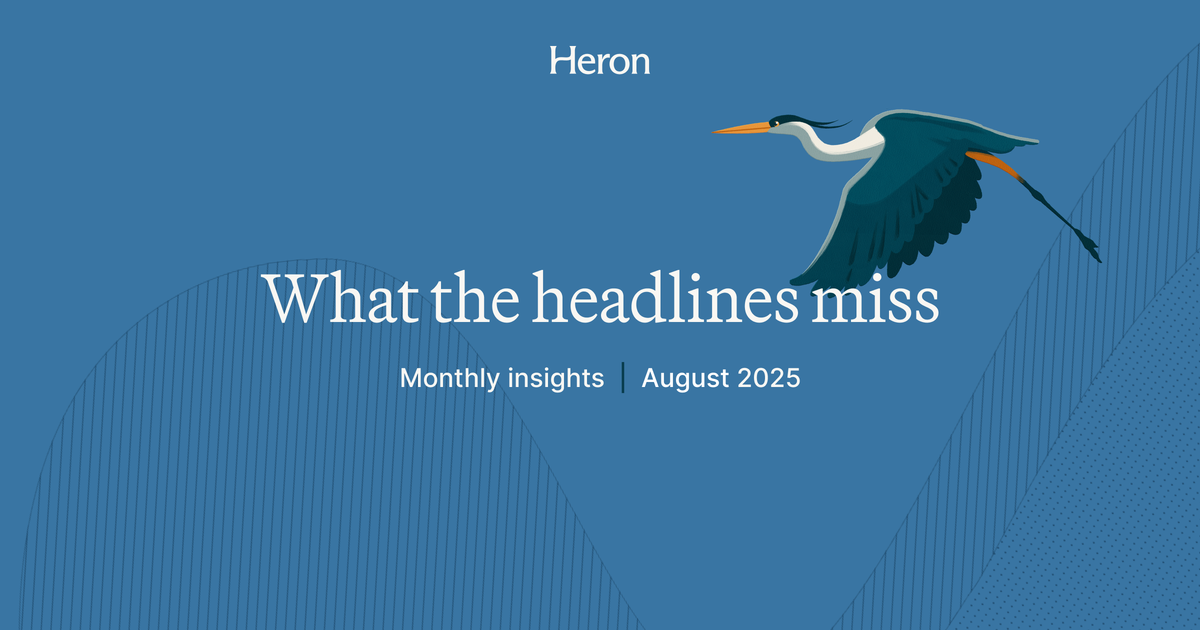Monthly insights: What the headlines miss (August 2025)
In this month’s insights, we’ll walk through what the headlines are saying and why when it comes to finding the winners in private credit, quality and diversification matter.

Monthly insights #5, August 2025
In this issue:
- Current events: What the headlines miss
- New data on Heron’s performance vs. peer group
- Antares Private Credit Fund added to Heron portfolios
- Quote of the month: Henry Ford on quality
Current events: What the headlines miss
Recent news headlines may give investors pause when it comes to investing in private credit. Like every asset class, there are winners and losers. And the media can grab attention by writing catchy headlines about the losers.
In this month’s insights, we’ll walk through what the headlines are saying and why when it comes to finding the winners in private credit, quality and diversification matter. Plus, scroll down to see new data comparing Heron to our peer group.
What's going on?
Recent news articles have covered potential warning signs for the private credit market, including:
- Overheating signs: UBS strategists warned that the private credit boom—spurred by AI investments—may be flirting with overheating.
- Defaults on the rise: Bloomberg’s recent coverage noted growing alarm over defaults and increasing PIK in the $1.7 trillion private credit market.
- Yieldstreet losses: CNBC recently provided an extensive account of Yieldstreet's severe credit losses. It has also been reported that a legal firm has started an investigation of claims on behalf of Yieldstreet investors and is pursuing recovery of losses.
These headlines do sound alarming. The data doesn’t look great. Take Yieldstreet Alternative Income Fund for example…
If you look at data from their Shareholder Report filed with the SEC and Yieldstreet’s own website, it reveals:
- Limited senior protection: Less than 30% of the Yieldstreet portfolio consists of first-lien loans, compared to approximately 90% in Heron portfolios.
- High concentration: The fund is relatively concentrated, with the top 10 positions representing more than 40% of total assets.
- Sub-par performance: Since inception, the fund has delivered only 6.4% annualized returns—well below the roughly 9% average achieved across private credit over the same period.
Remember this: Manager quality matters
Yieldstreet’s mounting losses and other warning signs trace back to one core issue: the credit manager’s experience.
Private credit is not about one-off bets. It requires consistency—executing the same processes repeatedly, at a high standard, year after year. Emerging managers, who often also face portfolio concentration challenges, typically lack the battle-tested experience needed to perform across multiple credit cycles.
At Heron, a manager’s track record is the foundation of our selection process. Every private credit manager we onboard has demonstrated quality across multiple dimensions, including:
- Prior downturn experience: True longevity comes from having navigated stress periods—Global Financial Crisis, European sovereign debt crisis, Fed rate hikes, and a pandemic. Credit managers with such experience can apply lessons from past credit cycles to balance downside protection with attractive risk-adjusted returns.
- In-house restructuring expertise: Credit managers with internal loan workout and restructuring capabilities tend to be better equipped to manage defaults, preserve collateral, and minimize realized losses.
- AUM scale: Multi-billion-dollar AUM firms often benefit from stronger deal-sourcing networks, deeper industry expertise, more efficient risk monitoring, and possibly broader exit options for their loans—all of which enhance investor outcomes.
The data: How Heron aims to deliver quality through diversification
We give you exposure to 12+ managers across all 11 GICS sectors. At the end of the day, you have over 3,000 loan exposures in your Heron portfolio.This level of broad diversification, grounded in quality, sets you up for a risk/return profile you likely can't get elsewhere.
Based on analysis of Heron's proprietary dataset, we've found that diversification adds clear advantages: portfolios with more loans have reported lower PIK, lower defaults, lower losses, and lower volatility of returns.
Here’s the new data comparing Heron to our peer group:
Dataset source: SEC filings for June 2025. Dataset includes over 60 of the largest U.S. private credit funds, which are actively managed by firms that collectively manage in excess of $1 trillion in private credit assets across their funds and accounts. Percentages shown as medians. Funds on Heron includes funds being made available through Heron as of August 2025. Peer group includes all funds in the dataset but excludes Heron funds. Notes: PIK Interest shown as PIK interest income as percentage of total investment income into the fund. Non-Accruals shown on a cost basis. Net Credit Loss shown as realized credit losses, net of gains, over the last 12 months, as percentage of fund net asset value. Loan Valuation based on first lien loan fair market value divided by cost. Underperforming Assets shown as percentage of assets considered by the underlying credit managers as performing below their own expectations, and not necessarily indicative of potential defaults. Total returns shown as annualized Q2 2025 IRR after Heron fees.
When it comes to understanding quality in private credit, we like to let the data be our guide. And while the news media digs into quality issues in the market, we’re dedicated to seeking out quality opportunities for your private credit portfolio.
As always, thanks for reading,
Heron Chief Credit Officer
From the Heron blog
Heron fund facts
Fact: Heron offers exposure to a diverse range of managers, from funds specialized in lower private middle market lending to larger fund managers that give you exposure to the upper middle market, non-U.S. investments, and asset based finance opportunities.
Why That Matters: By selecting fund managers that we rank as high-quality who have various strategies, you benefit from less concentration risk within your portfolio.
Quote of the month
“Quality means doing it right when no one is looking."
– Henry Ford
Get a diversified portfolio built for market volatility.

